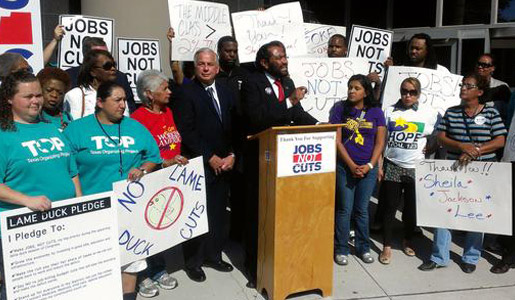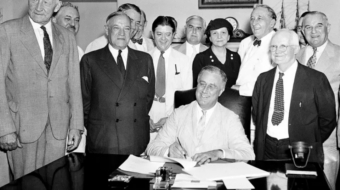
WASHINGTON (PAI)-Three of the nation’s largest unions, AFSCME, the National Education Association and the Service Employees, aired a “close to $300,000” radio, television and online ad blitz over the 4-day Thanksgiving weekend targeting nine key lawmakers on “fiscal cliff” issues, their government relations directors said.
Citing a survey the unions commissioned from the Mellman Group, the ads urge lawmakers to solve the nation’s budget hole by raising taxes on the rich and by creating jobs, the platform that brought Democratic President Barack Obama’s re-election.
The “jobs not cuts,” ads inform the lawmakers, including Sen. Claire McCaskill, D-Mo., both Colorado Democratic senators and both Virginia Democratic senators, that the poll – and the Nov. 6 election – show huge majorities oppose cuts in Social Security, Medicare, Medicaid, federal aid to education and funds for police and fire fighters.
The ads also target four House Republicans: Reps. Jo Ann Emerson, R-Mo., Don Young, R-Alaska, and two from Pennsylvania. That’s because all four showed a past willingness to work for bipartisan compromise on solving the deficits-and-debt tissue, said Mary Kusler of NEA. The four were among 40 GOP signers of a letter earlier this year, taking that stand, she said in a Nov. 20 telephone press conference.
“We’re just starting with these four. There’s no policy to let the 36 others go,” she told Press Associates Union News Service afterwards. The 40 “have shown a willingness to say the word ‘revenue’ and be part of the dialogue” on fixing the mess.
Obama and congressional leaders opened talks the week of Nov. 11 on resolving the “fiscal cliff,” the combination of tax increases – on the rich and the rest of us – and spending cuts due to start Jan. 1. Union leaders agree with Obama. But Congress, with a Democratic-run Senate hamstrung by GOP filibusters and a GOP-run House dominated by Republican tea partyites, must approve any “grand bargain,” to avoid the cliff.
Economists of all political stripes say the combination could remove up to $609 billion from the economy just in 2013 alone, throwing the U.S. back into recession. But a huge majority of the ruling House GOP – not including the four targeted by the ads – refuses to raise taxes on the rich.
The Tea Party wants just cuts in spending, a position that 23 percent of the 1,000 voters Mellman polled support. By contrast, 53 percent want a solution that calls for the rich to pay their fair share and Congress to concentrate on job creation to solve the deficit ills. Another 16 percent want a “grand bargain” with tax hikes and cuts in Social Security, Medicare and Medicaid. Mellman’s poll has a margin of error of plus or minus 3.5 percent.
“We’re calling on those (House) Republicans willing to put people ahead of the party line,” Kusler of NEA explained. The radio ads, she said, will run in St. Louis and Cape Girardeau, Mo., for Emerson, Anchorage, Alaska, for Young and the Philadelphia media market for Reps. Mike Fitzpatrick and Patrick Meehan, both R-Pa.
The TV ads in Missouri, the D.C. metro area – for the two Virginians – and Denver tell those five Senate Democrats that “the way to prosperity is to put people back to work,” said SEIU Legislative Director Peter Colavito.
The ad blitz and other moves by the three unions to campaign for jobs for the middle class and tax hikes on the rich may continue beyond the “lame duck” session of the 112th Congress, which is supposed to tackle the “fiscal cliff” issue, said AFSCME’s Chuck Loveless.
“We’ll monitor the lame duck and do whatever it takes, but we haven’t specifically decided what to do next” if Congress fails and the budget cuts and tax hikes – including reversal of a past cut in workers’ payroll taxes – kick in on Jan. 1, he added. “If this issue does go into next year, we’ll be there to continue the campaign,” he promised.
Other findings from Mellman’s poll included 86 percent saying “you can cut the deficit without cutting Social Security,” 84 percent with the same view about Medicare, and 83% said the deficit could be cut without cutting federal funds to local governments for police and Fire Fighters. Some 62 percent said the deficit could be cut without cutting education aid.
That contrasts with a poll by the moderate New Democrat Network, released the same day, showing 82 percent support for a compromise – terms unspecified – to help slow the flow of red ink. Mellman didn’t see a contradiction between the two surveys, since NDN’s poll did not ask about specific program cuts, while his survey did.
“Both parties need to listen to the will of the voters and focus on rebuilding the middle class and strengthening our economy by investing in jobs, not cuts. We will forcefully oppose any budget deal that puts working families and the economic recovery in jeopardy,” Colavito told the telephone press conference. “It makes no sense to rob Peter to pay Paul, especially when Peter is a 5-year-old who simply is trying to learn in school. It’s short-sighted,” Kusler added then.
“The voters spoke loud and clear and rejected any cuts in Medicare, Medicaid and Social Security,” Loveless concluded.
Photo: SEIU.org










